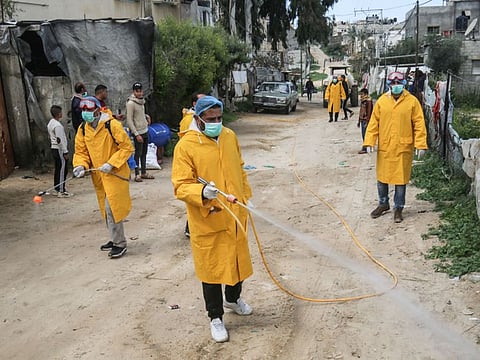Coronavirus: Conflicts on hold for now as players face a common enemy
Economic fallout of a shutdown over COVID-19 likely to reflect on social security

As regional governments stepped up measures to confront the deadly novel coronavirus pandemic, something unique is happening: Conflicts are being set aside for now as allies and foes focus on fighting a new common enemy. In fact, with a few exceptions, the world has never been as peaceful as it is now. It is as if the scourge has neutralised bitter conflicts and in many ways highlighted their triviality.
Middle East
The Middle East is a case in point. For more than a week now the Gaza-Israel front, until recently a hotspot, has been silent while both sides intensified efforts to contain the spread of the virus. Israel, in particular, has a big problem with the number of cases passing the 1,000 mark with one fatality.
It has enforced strict measures such as closing its borders and airports and ordering citizens to stay home. For weeks Gaza was virus-free, but this week, health authorities there announced that two Gazans returning from Egypt had tested positive and were in quarantine.
In an appeal issued on Monday, UN Secretary-General Antonio Guterres urged warring parties across the world to lay down their weapons in support of the bigger battle against Covid-19 — the common enemy that is now threatening all of humankind
Gaza Strip
The prospect of a widespread contagion in the heavily-populated and under-equipped Gaza Strip is presenting a nightmare for both Hamas and Israel. The latter is under pressure to ease its decade-old blockade to allow for humanitarian aid to pass.
Hamas, on its side, is now revisiting its position on the conditions set for a long-term ceasefire with Israel and there are signs that the two sides may reach a new understanding soon that will boost the capabilities of the health authorities in Gaza.
On the other hand, Israel and the Palestinian National Authority (PNA) are also working together to stem the spread of the virus. They had reached an agreement to close their borders, while the Palestinian side enforced a two-week curfew as more than 50 cases of infections were discovered.
Earlier this week, the Israeli side released about $30 million (Dh110.34 million) in taxes collected on behalf of the NPA to help Palestinians contain the spread of coronavirus.
Even the peace plan initiated by United States President Donald Trump is now on the shelf as the US and Israel direct their attention towards limiting the devastating effects of the coronavirus outbreak.
Lebanon
In Lebanon, as well as in Iraq, anti-government protests had subsided as governments in both countries triggered a state of national emergency to fight the spread of the disease. Pro-Iranian militias have targeted bases used by the US military in Iraq, killing two American soldiers in one incident, but reports say the US had decided not to retaliate as both Baghdad and Tehran battled against the spread of the virus.
Algeria
In Algeria, mass protests had come to a halt as curfew was imposed to contain the sudden rise in viral infections. In Tunis, attacks on the new government have been set aside as the country goes into lockdown.
Iraq and the Kurdish self-rule territory in northern Iraq had sealed off their land borders with Iran to contain the spread and this may have cut off logistical support to pro-Iranian militias.
Syria
In the rebel-held Syrian province of Idlib, tension is high but a shaky truce between Turkey and the regime, through Russia, appears to be holding as Ankara warns of the spread of coronavirus among hundreds of thousands of displaced Syrians close to its borders. The ceasefire deal coincided with the regional virus outbreak and helped deflect attention from day-to-day confrontations.
On its part, the Syrian authorities insist that territory under their control is free of the virus, but reports suggest that fighters belonging to Iranian militias in Syria have been infected and that Damascus may be withholding information. Also, there have been no new reports of Israeli raids on Syria for more than a week now.
Libya
In Libya, the situation is fluid, but reports say that forces belonging to renegade General Khalifa Haftar have resumed their assault on Tripoli. But Libya’s United Nations-backed government has accused a Syrian airline of exposing the war-torn country to coronavirus by flying mercenaries, connected to a Russian private military contractor, as well as members of Lebanon’s Hezbollah and Iran’s Revolutionary Guard into the eastern city of Benghazi, which is under Haftar’s control. On his side, Haftar is accusing Turkey of bringing in mercenaries and spreading the virus.
Common enemy
This unprecedented state of regional calm may not last for long, depending on how successful governments are in containing the spread of the deadly virus. In an appeal issued on Monday, UN Secretary-General Antonio Guterres urged warring parties across the world to lay down their weapons in support of the bigger battle against Covid-19 — the common enemy that is now threatening all of humankind.
India
— Osama Al Sharif is a journalist and political commentator based in Amman.



